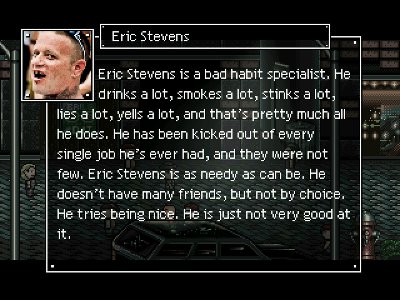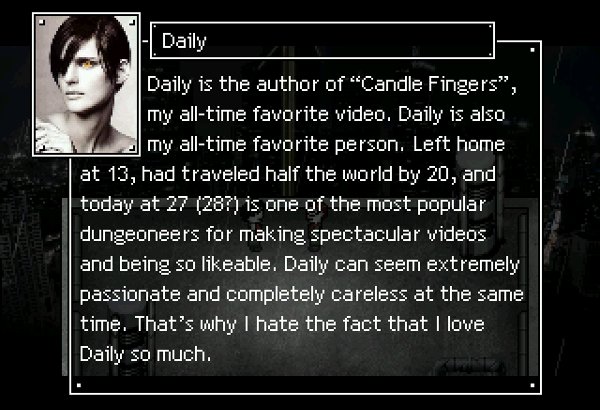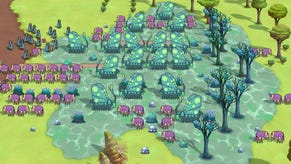Wot I Think: Beautiful Escape: Dungeoneer
In a year where a fake game about being a serial killer was at the center of an internet whirlpool, it's somehow pleasing that another serial killer game was actually released and has performed its act of unspeakable brutality without drawing much attention to itself. Only the detectives of ElectronDance brought it to my attention. The contrasting approach to the subject matter of the two games seems to follow the ideas of serial murder which they're most interested in. Serial Killer Roguelike was all cheap opportunism, (metaphorically) breaking in an open window, cutting up its victims and smearing itself in viscera. Beautiful Escape: Dungeoneer is about the secretive killers who do their grim work for years and no-one will ever know - except their victim, and only too late. In other words, a serial killer who's all the more disturbing.
Beautiful Escape: Dungeoneer is also more disturbing in a key, important way. It actually exists.
Constructed in RPG Maker 2003, this is the second game released this year by Nicolau "Calunio" Chaud. The other one was Marvel Brothel. Like that, it takes a game which most would play for cheap laughs and actually takes it seriously (Very Seriously Indeed - Jarvis Cocker). You play as Verge, a junior and generally inconsequential member of international organisation of Dungeoneers. These are a group of organised Serial Killers - with shades of The Collectors in The Sandman's Dolls House - who upload videos of their killings online for the appraisal of their peers. These are SAW-esque murderers, performing the deed by a series of traps designed to mentally and physically destroy their victims. Their paragon and dream is the "Beautiful Escape" - one which leaves the individual at the verge of mental and physical collapse, able to go free, but forever trapped in their experiences.
So a little like working on RPS for 3 years, really.
The game basically a Japanese style RPG which rejects the general conventions of the genre in favour of metabolising the dating sim and - no, really - the Tower Defence game. The former is the hunting of your victims, where after being presented with a brief bio of the person who caught your eye, you have to work out the best way to unpick their psychology to the point where they trust you. At which point, you utter the phrase that lies as close to Dungeoner's heart as "Avoid Missing Ball For High Score" lies to Pong: "Come Home With Me"

The latter is what happens when they're safely in your dungeon. They escape, and follow a direct path through the darkened cellar. Before they do so, you place traps along their way, each of which will either sap their sanity or their health or both. Plus other secondary effects, obv. A Chainsaw will lead to limb loss, and slowing their progress for the rest of the dungeon. The expressed aim is to try and create the aforementioned Beautiful Escape. In most cases, you're happy to make sure they don't leave the level, as that's the game's one game over. Assuming you haven't made the fatal mistake of being unfatal, you upload your video to the Dungeoneer's site and let the critics have their day.
Their blades tend to be far sharper than yours.

And that's me doing pretty well.
As well as these core mechanics, the game's held together by the actual story of Verge's existence and the world which he moves. The reference would be the existential wearying gloom of something like Se7en, rendered in retro-RPG aesthetics. Backstreet armouries giving you traps in hope of a better quality of film than the hapless Verge has been delivering. Meeting names-from-the-internet at the Ballardian airport. And most memorably, the actual street scene where hundreds of figures blur past you at hyperspeed while the actual victims who catch your eye wander aimlessly like confused sheep. Then there's Daily, a fellow Dungeoneer - but where Verge is mediocre, Daily is mercurial, feted by the whole community, and is trying to reach out of what they now consider a tired little ghetto. And Verge loves them, body and shrivelled soul.
You'll note that I'm avoiding a sexual pronoun by Verge, because I'm not entirely sure the game ever used one. Look at Daily...

...and with that feminine, leaning androgynous look, it's just about possible Daily is male. In which case, it'd make this not just the second great gaming love story of the year, but the second secretly homosexual love story of the year.
Or I may have just missed a sexual pronoun somewhere. Just a thought, because it's the sort of game where you feel entirely comfortable making that kind of leap, as you suspect the author is all too aware of what they're playing with.
Obvious point: Chaud is a psychotherapist. He's thought about what he's doing here. And there's more of that in the spoiler-heavy section at the bottom.
Technically speaking, the game's got a fair few weaknesses - though the old RPG Maker is used with impressive expertise -- especially when you realise the game was made within a couple of weeks for a community competition based on the word "Escape". The main ones come in the actual escape sequence, where it's a little too much trial and error. It's entirely possible you'll get traps which are unable to kill the victim, in which case they escape, and it's a game over. Also the sustainable traps - where you have to hammer the 1 and 2 keys on the keyboard - aren't explained, meaning you're sure to blow it first time. Since they're things like the enormous drill - always a good thing to leave by the door just as someone can feel the light on their face - that can prompt a game-over. There's a little too much backtracking upon loading a save too - as in, you don't get a chance to save before you run the your torture, meaning you have to go through the mechanical "seduction" sequence again.
I haven't mentioned the game's main strengths yet, have it?

It's disturbing.
It's incredibly disturbing. It's one of the more disturbing games I've played. Not out of sheer revulsion and horror - which is all too easy - but the sort of disturbing which one can defend and recommend. It's a game which sets out a world and explores it, fearlessly. It's disturbing, but something I'm comfortable with recommending. Meanwhile, like Marvel Brothel, Chaud plays fast and loose with the copyright laws and appropriates and uses whatever he wishes, game-creation like 80s-first-wave sampling. From the Abu Ghraib-remix title screen onwards, this uses every tool available to create something that's strikingly atmospheric. It's excellently written, in a carefully clipped style which fits the demands of its genres perfectly. It knows how to use the ironic effect of the low-res graphics to chill, in a far less garish way than - to choose a relevant example - Super Columbine Massacre RPG!
It's also well aligned to the flow of popular culture. Vampires moved from horror objects to objects to sympathy to objects of fluffy lust. As our fictional monsters lost their edge, we turned to real world ones - or rather, a cinematic version of real world ones. And those in turn are turned sympathetic, first with pity, and then with identification. The line from early SAW ("All the people deserved it") to Dexter ("If I was going to be a serial killer, that's the sort of serial killer I'd want to be") is pretty clear. Beautiful Escape positions The Serial Killer as tormented artist, as emo as a guy plonking out sad ballads about a girl in his bedroom. Verge is human impotence and isolation. And equating a serial killer with a more standard alienation is an easy idea to reject as immoral. Easy and wrong. I'm with Wilde here: "There is no such thing as a moral or an immoral book. Books are well written, or badly written." The same's true about games, and in both the language of words and the language of games, Beautiful Escape: Dungeoneer particularly well written.
It'll probably take you about an hour to get through, if you pursue the central plot determinedly. It's got one of the sharpest endings of the year. I recommend you play it. And when you do, come back, because I've got some extreme Spoilers - both plot and mechanic - to talk about beneath the following image...

Dungeoneer is a pretty brutal finger pointed at all manner of things. The metacritical elements are immediately notable, especially in the Dating sequence. Normal Dating Games are a little questionable, but this reveals how openly disturbing they are by changing the identity of the person trying to befriend the individual. It's all about hiding the self to gain what you want, and that's all these games boil down to. Even the aforementioned mechanistic replay underlies the point - that dating sims have a blank hole in their chest were their soul should be.
Most profound - and talking about far more than just games - is the actual rating of your murders. You get given a score out of five stars from the community, sure, but... well, it doesn't matter. Their applause or boos doesn't change anything. In this interview with Jordan Rivas Chaud talks about how he wanted to comment upon the RPG Creator community, where "people create and be praised for games that reflected nothing of their individualities, but only reproduced current trend and community standards." You try and kill people in a certain way, because other people say you should. "The Beautiful Escape" is a social construct you're trying to conform to. That's not art. That's the opposite of art.
The game ends with Verge, having brought the now-submissive Daily back to the Dungeon for one last attempt at a Beautiful Escape. At the exit to the line of horrors, just as Daily is about to go free, Verge fires a bullet right through Daily's head. He rejects the Beautiful Escape. He notes...

...Which is Chaud's J'accuse at the community he finds himself.
The community walked into this carefully prepared trap. It didn't place in the competition it was created to participate in. Its general ratings are mediocre, a product of the extreme responses it generates. It exists as a provocation against the stupefying rewards of dull conformity in favour of something more individualistic. It simply rejects anyone's ability to judge it, a chainsaw brought against a Metacritic-average-beatifying culture's kneecaps.
It's also, as I said, a pretty moving short-form dark, dark romance. You can download it here. It's strong stuff, however you choose to define that.









